Aug 2012
Aug 2012 sadminAll aboard to empower women
All aboard to empower women sadminEmployment news
All aboard to empower women
SAnews.gov.za
The private sector should help to advance gender equality and empower women by partnering with government, said Director of Gender and Women Empowerment at the Department of Trade and Industry (dti), Ntombi Shangase.
Speaking at the launch of the Women on Board Programme, Shangase said a register of trained women would be compiled, where companies and other government departments can recruit women for directorships.
The Women on Board Programme was recently launched in Johannesburg by the dti, together with the International Federation of Business and Professional Women, Deloitte and Touche, and the United Nations. The programme is designed to discover, train and deploy female management talent by strengthening the participation of women in boards.
“For the dti, empowering women to participate fully in the country’s economy across all the sectors is essential in order to build a stronger economy, achieve internationally agreed goals for development and sustainability, and improve the quality of life for women, men, families and communities,” Shangase said.
Deloitte and Touche Director Anthea Scholtz said the training would be conducted on various aspects of leadership, including governance, ethics, risk management, internal audit, sustainability and integrated reporting.
“We are taking a holistic development of existing and aspiring female directors in that all the trainees will have an unlimited year- long access to the e-learning that Deloitte and Touche provides to their senior management,” Scholtz said.
Auto hub aims to make a dent in unemployment
Auto hub aims to make a dent in unemployment sadminEmployment news
Auto hub aims to make a dent in unemployment
Neo Semono
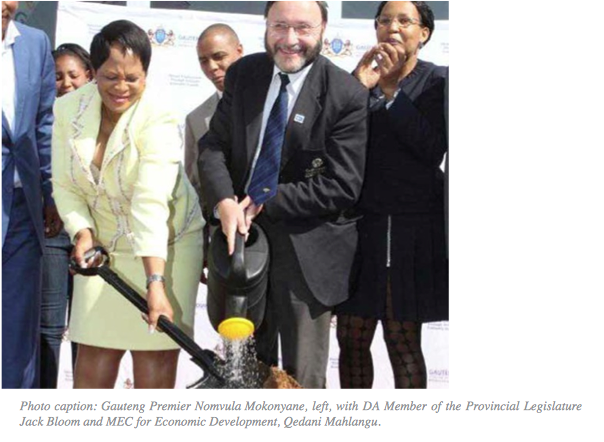
By July next year, Winterveldt some 40km outside Pretoria, will have a workshop big enough to accommodate17 mechanics and panelbeaters who operate as co-operatives.
The R58 million structure in one of the province’s poorest areas, will provide cooperatives in the automotive sector with free training and support, as well as equipment. Called the Automotive Hub, it is the first of three such initiatives in the province, designed to address youth unemployment. It will be followed by the Enterprise and Industrial Hubs. Construction of the hub started in July.
“This is part of interventions to address some of the challenges. It may not be a solution to everything, but it’s an intervention to some of the real challenges,” said Gauteng Premier Nomvula Mokonyane at the recent launch of one of the Township Enterprise Hubs focusing on the automotive sector.
The hubs will go a long way in addressing unemployment in the country, which currently stands at 25,2 per cent. The majority of jobless people are the youth.
First of its kind
The project, the first of its kind in the country, will also include other support sectors. So far, MTN has signed up for the project, while the Consumer Goods Council has also been approached, Premier Mokonyane said.
The hub, which will be linked to the Rosslyn automotive sector, is aimed at those who are un skilled and the semi-skilled, Premier Mokonyane said. “There are many people who are doing auto mechanics in their backyards. We want to formalise them; let them be integrated in the formal economy.”
“We are tapping into what already exists. We are providing an opportunity that is organised, that is linked to the formal economic sector and most importantly we are going to make sure that their businesses are supported in terms of the supply chain. They will be able to be linked to the private sector and various companies,” she said.
Selection criteria
The hub will develop young people’s skills, said Gauteng Economic Development MEC Qedani Mahlangu. He added that the “pathfinder” co- operatives would receive assistance for a period of between 18 to 24 months after which other cooperatives will be identified.
The selection criteria for cooperatives included membership of a minimum of fi young people, as well as that the cooperative had to be sector specific.
“As long as you’re young, willing to go into entrepreneurship and you are sector specific people will be considered. We are continuing to assist young people to form cooperatives,” he added.
The hub will also sport an internet café and an arts and craft shop, as well as car-spraying services, among others.
National Youth Development Agency chair- person in Gauteng Simon Molefe said the hub spoke to economic freedom, as well as formalising township businesses.
Resident Vincent Mabhusha said he was very happy about the hub, as it would create much- needed opportunities for the youth. Within a year, Winterveldt will be a bustling centre of economic activity.
For more information, call the Gauteng Department of Economic Development: 011 355 8000
BASICally ready to reduce greenhouse gases
BASICally ready to reduce greenhouse gases sadminInternational relations
BASICally ready to reduce greenhouse gases
SANews.gov.za
Developing countries have showed their commitment to the global fi against climate change and have presented actions that will be taken to reduce greenhouse gas emissions. According to the ministers dealing with climate change from the BASIC group of countries – Brazil, South Africa, India and China – developing countries are ready to help fight climate change, but developed countries must take the lead.
The ministers met in Sandton, Johannesburg recently for the 11th BASIC Ministerial Meeting on Climate Change, where they implemented the agreement reached at the 10th Ministerial Coordination meeting held in New Delhi, India in March this year.
“The change we are experiencing is the result of emissions that occurred a long time ago and is the responsibility of the industrial countries,” said Ambassador Luiz Figueiredo Machado, under-Secretary for Environment, Energy, Science and Technology of the Ministry of External Relations in Brazil. “We are not responsible for what is going on, but we are ready to help fight the problem.”
The BASIC countries have been playing an increasingly important role in international environmental governance. South Africa has hosted COP17-CMP7, Brazil hosted the Rio+20 Conference, India is expected to host COP10 of the Convention on Biological Diversity in the coming months and China hosted the UNFCCC inter-sessional meeting in Tianjin in 2010 in the run-up to COP16-CMP6 in Cancun.
The ministers called for the adoption of a 2nd Commitment Period under the Kyoto Protocol* and its immediate implementation at the beginning of 2013.
South African Minister of Water and Environmental Affairs Edna Molewa noted that Africa was part of the whole world and that there were measures to move on to transition to a green economy.
“We’ve begun implementing alternate energy resources, we’ve committed and are ready going forward.”
* The Kyoto Protocol is an international agreement linked to the United Nations Framework Convention on Climate Change, which sets binding targets for 37 industrialised countries and the European community to reduce greenhouse gas emissions. The Protocol was adopted in Kyoto, Japan, on 11 December 1997 and entered into force on 16 February 2005.
Breast stays best for babies
Breast stays best for babies sadminHealth
Breast stays best for babies
Thalia Anderson - Department of Health
South Africa will join the world in celebrating World Breastfeeding Week which is held annually from1 to 7 August.Thisyearmarksthe20thanniversary of a week that promotes breastfeeding as the best feeding option for all babies.
South Africa has committed itself as a country that will actively promote, protect and support breastfeeding as the best infant feeding option for all children.
During Breastfeeding Week, the Department of Health aims to create awareness about the importance of mothers continuing to breastfeed when they return to work. Working mothers should be enabled to pro- vide their babies with the best feeding option. Studies have proved that breastfed babies are less prone to infections and conditions such as diarrhoea and pneumonia. Due to the reduced risk of infection, breastfed babies are more content and less frequently sick, which reduces the mother’s absenteeism from work.
Workplace
There is evidence that combining work and breastfeeding has benefits for the mother, the baby and the employer. Many mothers have succeeded in combining breastfeeding and employment with support from families, community and employers.
This can be achieved through the provision of comfortable, private areas or corners at the workplace for expressing and storing breast milk and where childcare facilities are established. The expressed breast milk can be fed to the baby while the mother is at work.
Breast milk alone for the first six months is the only food a baby needs. This means no water or any other fluid or food needs to be given to the baby for the first six months. Continued demand feeding at night is important to increase milk production – the more the baby feeds the more milk the mother produces.
HIV and AIDS
South Africa has experienced a decline in the culture of breastfeeding over the past decade mainly as a result of the HIV and AIDS epidemic and the marketing of breast milk substitutes that promote infant formula as equal or superior to breast milk.
Recent guidelines from the World Health Organisation (WHO) based on scientifi evidence, recommends that HIV-infected mothers can breastfeed their infants, provided they take anti-retroviral drugs to prevent HIV transmission from mother to baby.
The Department of Health has therefore adopted the WHO recommendation as part of government’s commitment to reduce the infant mortality rate in South Africa.
For more information, call the Department of Health: 018 4730324
Careers in water: go with the flow
Careers in water: go with the flow sadminYouth matters
Careers in water: go with the flow
Gabi Khumalo
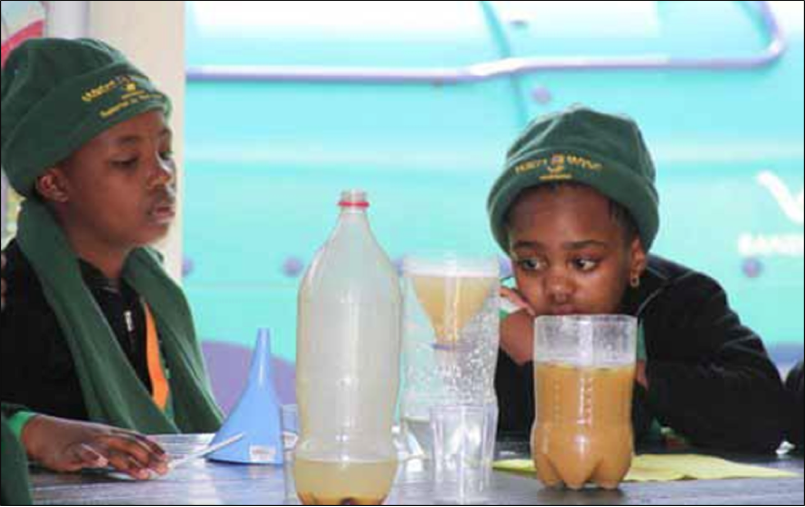
Photo caption: Through schools programmes at both primary and secondary levels, the Department of Water and Environmental Affairs raises awareness of water conservation and water-related careers.
The water sector in South Africa needs people with technical skills to ensure resource management. Learners are therefore urged to take up studies in Maths, Science and Technology to close the skills gap and address the challenges facing the water sector.
Speaking during the 2012 National Youth Water Summit, Minister of Water and Environ- mental Affairs Edna Molewa noted that while South Africa was blessed with vast natural resources, it was not blessed when it came to water and was currently ranked among the 30 driest countries in the world.
“The water sector is faced with a challenge of dwindling technical skills as many technicians and engineers are aging and will soon be retiring … We therefore need more of our children to study Science and Mathematics and go into these areas of work,” the Minster said.
Water resource management
She said the sustainability of this resource would be achieved only if citizens were educated about water resource management, sanitation, health and hygiene.
“The participation of our communities and our children as stakeholders is crucial to us achieving this goal.”
Held under the theme Meaningful participation of Africa’s youth in water resource management can contribute to sustainable development, the Youth Water Summit was an opportunity for youth to participate in various educational activities.
The aim of the summit was to empower the youth to actively participate in water conservation and to pursue water-related careers.
The department is driving education and awareness programmes such as the 2020 Vision for Water and Environment Education Programme. It includes the South African Youth Water Prize, aimed at educating society about the importance of water conservation, management and sanitation.
Baswa Le Meetse wards
The programme also includes the Baswa Le Meetse Awards, which focuses on primary school learners. Through these initiatives, which are both educational and fun, the department is able to create awareness of the limited water resources and the need to protect and conserve them.
Confidently counting their chickens
Confidently counting their chickens sadminEmployment news
Confidently counting their chickens
Puleng Kekana
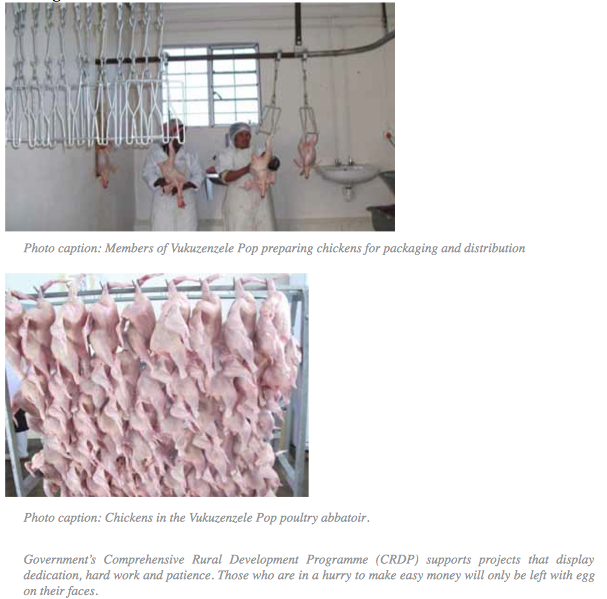
Back in 2007, meat in the village of Pearston was a luxury enjoyed only by those who could afford to travel to butcheries in Somerset East and Graaff Reinet.
However, this changed when a group of unemployed residents in the Blue Crane municipality of the Eastern Cape decided to start a poultry and crop farming business. Seeing a gap in the market, members clubbed together to form the Vukuzenzele Pop to supply meat in the area.
The provincial Department of Agriculture donated the initial batch of 200 chickens and the Blue Crane Municipality provided them with land for farming.
Today, they generate funds to support their families in one of the poorest towns in the Eastern Cape. The project also serves as a vehicle for job creation to address poverty and unemployment in Pearston.
Starting off humbly, the group patiently set about building chicken coops, hatching baby chicks, raising and selling chickens, while saving to reinvest in the business. They also planted and sold vegetables.
Success and recognition
Along the way, some members chickened out, but a core group of 12 members, including 10 women, stayed the course. Today, the chickens have hatched and cooperative members can confidently count them. In 2010, the project won the National JET Community Builder of the year competition. They have now been entered for the International JET Awards.
In 2011, they were crowned the Eastern Cape Female Entrepreneurs of the Year by the Department of Agriculture, Forestry and Fisheries. With success came recognition and more support from government.
Their hard work and success resulted in the Department of Agriculture donating a tractor and providing the services of a mentor to help develop their business and farming skills. The Department of Trade and Industry provided the group with a new bakkie, broiler chickens and chicken feed.
In addition, the Department of Land Affairs recently gave the project more land to expand its activities. Added funding from the Department of Social Development, the Department of Rural Development and Agrarian Reform (DRDAR) and the Department of Trade and Industry is also helping the group to increase their production.
Vukuzenzele Pop is now able to supply meat and vegetables for funerals and weddings in and around the area. They have their own poultry abattoir, the only one of its kind registered with the National Department of Agriculture. Members share a third of their income and deposit two thirds into an investment account.
Shining example
The project is a shining example of the success- ful implementation of the CRDP, which aims to create vibrant, equitable, sustainable rural com- munities and food security for all.
The CRDP’s focus is on enabling rural people to take control of their desitiny with support from government. It encourages people in rural areas to produce food for themselves, develop farming businesses and start village industries.
Since it was launched in August 2009, the programme has created 15 336 jobs, established 3 258 food gardens, trained 3 819 people in master gardening, household food gardening, financial management, community-based planning, arts and crafts and indigenous seed production. About 658 co-operatives and councils of stake- holders have been established.
For more information, call the Eastern Cape Department of Agriculture: 040 639 1180 or call Mphati: 012 312 8112
Connecting jobless with employers
Connecting jobless with employers sadminConnecting jobless with employers
Stephen Timm
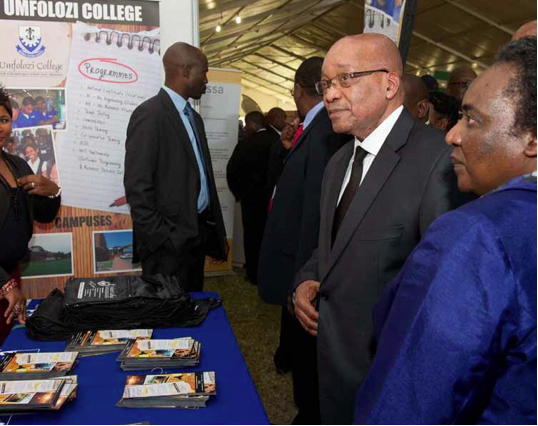
Photo caption: After officially opening the Richards Bay Jobs Fair, President Jacob Zuma, accompanied by Labour Minister Nelisiwe Mildred Oliphant, interacts with representatives from various employers and tertiary institutions.
With a number of large infastructure projects under way, people looking for work will have the chance in the next few months to connect with employers – from companies and state entities – at jobs fairs around the country.
The fairs are being hosted by the Department of Labour alongside job summits to put work-seekers in touch with prospective employers. Those attending will also be able to register their details on Labour’s electronic database – Employment System SA (Essa) – which can help match work seekers with vacancies.
So far two jobs fairs have been held – in East London in May and in Richards Bay in July. Fairs will also be held in Rustenburg on 3 August, in the Northern Cape on 10 August, Mpumalanga on 17 August, Limpopo on 31 August and Gauteng on 14 September. The Department of Labour is still finalising venues and locations as well as dates for fairs in the Free State and Western Cape.
The department’s Deputy Director-General of Public Employment Services, Sam Morotoba, said the two fairs held so far had attracted thousands of job seekers.
In East London about 6 000 visitors and 700 representatives of employers attended over two days, while the Richards Bay fair, which took place on 5 and 6 July, attracted almost 12 000 visitors and about 800 representatives from state-owned enterprises, as well as big and medium-sized companies taking part.
The jobs fairs will offer work seekers soft skills, information and a face-to-face search for placement opportunities be they further learning, self-employment, co-operatives, community works or public works programmes and formal employment.
They will run alongside exhibitions, which offer attendees an opportunity to interact with various government departments, prospective employers, enterprise development organisations and a host of others.
Morotoba said at the fairs, employers and human-resource representatives would also brief job seekers about major infrastructure projects that are planned for the area and the skills required for these projects.
Ministers and officials from various departments are also on hand at fairs to deal with any blockages that employers are facing and that may delay certain projects and the hiring of new employees.
The department plans to register at least 600 000 job seekers on the database by March next year. It also wants to ensure that at least 450 000 work seekers are placed in opportunities or provided with other services from the department such as career guidance, within 30 days of registration.
Career guidance
Morotoba said applicants had the option of either registering on the database themselves
– by visiting www.labour.gov.za – or queueing at jobs fairs. Those who register on the database will have a reference number sent to their cellphone.
He said a number of work seekers had al- ready been placed with several companies, including with BHP Billiton and Transnet and with contractors on the Medupi power project. Others have been placed in temporary work with the Independent Electoral Commission and Census 2011.
A major challenge, said Morotoba, was that only about 40 per cent of those registered on the site had matric. However, there were options for those who didn’t have matric – including finding temporary work through the Expanded Public Works Programme (EPWP) or Community Works Programme.
He said the department was encouraging employers to use its database – pointing out that the database was free to use and reduced the time spent on recruitment by companies. Some companies had been able to source 80 per cent to 90 per cent of the workers they needed for a certain project by using the database.
By using the database employers can also be sure that employees will be registered for the various requirements under labour law – such as the Unemployment Insurance Fund.
National Skills Accord
Addressing the Richards Bay jobs fair, President Jacob Zuma said solutions to the jobs crisis would not come from government alone and that government, business, labour and society at large must join forces – in initiatives such as jobs fairs.
He said government wanted to support youth employment through improving the competitiveness of the economy by boosting small and medium businesses, expanding temporary public employment programmes such as the EPWP and by creating 20 000 learnerships per year.
President Zuma said government had also signed a National Skills Accord with all the social partners. It provides business and state- owned enterprises with clear numerical targets to increase the number of apprenticeships and take on learners and interns for practical workplace experience.
He added that the establishment of two new universities in Mpumalanga and the Northern Cape respectively would also boost access to higher education considerably.
For more information, call the Department of Labour: 012 309 4000
Dream jobs abroad for tourism students
Dream jobs abroad for tourism students sadminEmployment news
Dream jobs abroad for tourism students
Sydney Masinga
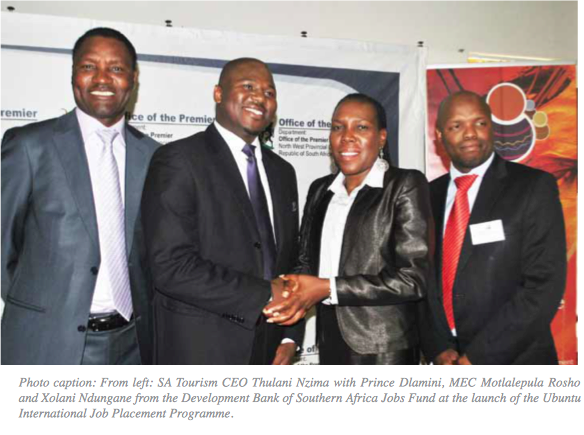
Travelling to faraway places and exploring different cultures while gaining work experience, is something most young South Africans can only dream about.
For a group of young people from disadvantaged communities in North West, this dream is about to come true through the Ubuntu International Job Placement Programme. The programme, which is an initiative of the Ubuntu Institute, was launched in Mahikeng, North West recently.
Set to benefit youth who are interested in working in the hospitality and tourism industry, the programme will give about 200 young people from rural areas an opportunity to be placed in internship programmes in various countries around the world for a period of six to 12 months.
World-class resorts
This is a “unique programme in South Africa facilitating international jobs, internships, learnerships, short leadership development programmes and graduate skills development programmes in the United States of America, Canada, Europe and Asia”, said North West Premier Thandi Modise.
Ubuntu Institute founding chief executive Prince Cedza Dlamini said participants would be able to return home and kick-start their careers at a higher level.
“The internships provide much-needed working experience at world-class 5-star resorts,” Dlamini said.
Positions are also available in the ICT, mining, agriculture, engineering, marketing, legal and financial services sectors, he said.
Funding
The programme is funded by the Development Bank of Southern Africa’s Jobs Fund. Key partners include the national Department of Tourism, the Federated Hospitality Association of Southern Africa and the South African Graduated Development Association.
For more information visit: http://www.ubuntuinstitute.com or www.nwpg.gov.za
Employment news
Employment news sadmin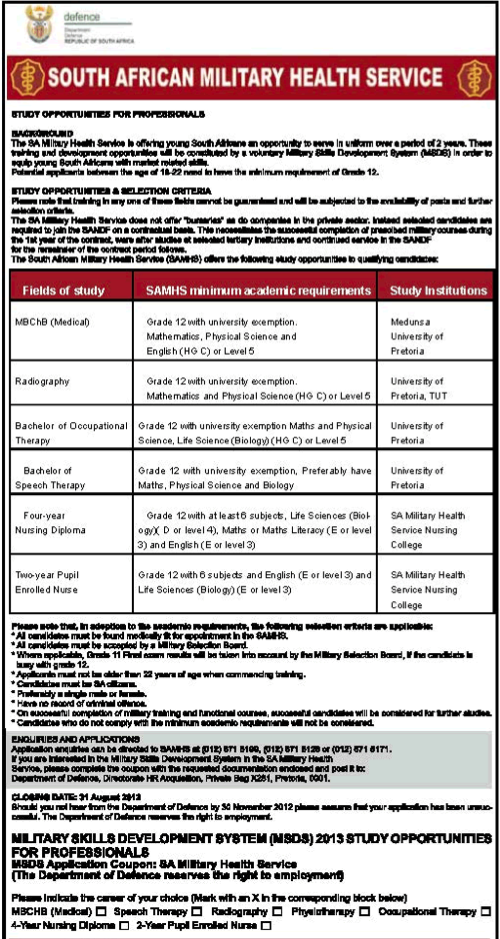

Employment news
Employment news sadmin
Employment news
Employment news sadmin
Employment news
Employment news sadminEmployment news

Employment news
Employment news sadminEmployment news

Energy mix will keep the lights on
Energy mix will keep the lights on sadminInfrastructure development
Energy mix will keep the lights on
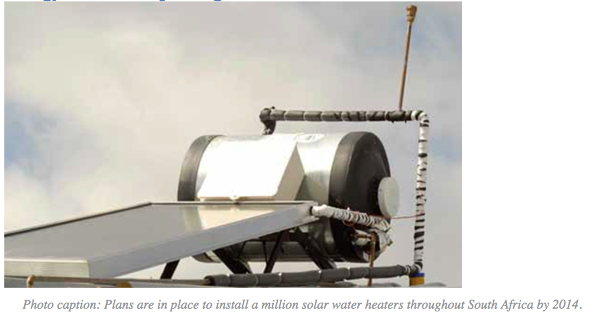
The cold weather has placed tremendous pressure on electricity supply. Despite this, government is committed to keep the lights on and avoid having to go back to the blackouts experienced in 2008. Still, South Africa’s power supply in the next 18 months is expected to be tight, said Public Enterprises Minister Malusi Gigaba.
Gigaba said the situation was expected to continue until the first unit of the coal fired Medupi Power Station is up and running. Medupi is due to deliver first power to the grid at the end of 2013.
However, “very tight balance between supply and demand remains”, the Minister noted.
integrated resourCe plan
In the meantime, Minister of Energy Dipuo Peters said government would ensure security of energy supply with an energy plan that would meet the needs of our growing economy. She added that this would be done without compromising our commitment to sustainable development by utilising our fossil resources* responsibly.
Speaking at a recent breakfast event, the Minister said the Department of Energy would use the Integrated Resource Plan (IRP) to address the energy challenge. The IRP requires South Africa to generate about 42 per cent of its electricity from renewable energy resources*.
Peters said the IRP emphasised broadening electricity supply with an energy mix that would include gas, imports, nuclear, biomass, and renewables (wind, solar and hydro).
Regarding the objectives set for the green economy under the New Growth Path, the implementation of the IRP will make an important contribution towards stimulating the green economy. More than 12 000 construction-related jobs and just above 1 000 permanent jobs are expected to be created under the programme, Minister Peters said.
The Minister added that the local assembly of goods was important to creating jobs and should form part of South Africa’s energy plan.
Solar water heaters
Using the example of solar water heater systems, the Minister said to date over 250 000 had been installed throughout the country with a target deadline of 1 million to be installed by 2014.
The IRP programme also provides for local content in the provision of alternative energy sources. Only those suppliers who commit to localise their products will therefore be able to participate in the government funded subsidy programme.
“Over the next three years, we will spend R4,7 billion on this programme, and my view is that we cannot export the job creation potential that this allocation has,” Minister Peters said.
* Renewable energy is energy generated by natural resources such as sunlight (solar), wind, and water (hydro). Renewable energy does not have a limited supply and can be used again and again.
* Fossil fuels such as coal, oil and gas are fuels containing carbon that was formed over millions of years through the decay, burial and compaction of rotting vegetation on land, and of marine organisms on the sea floor. Burning fossil fuels can add to the greenhouse gases in the atmosphere.
For more information, go to: www.energy.gov.za
Fighting for victory till the last drop
Fighting for victory till the last drop sadminSport
Fighting for victory till the last drop
Nthambeleni Gabara
Photo caption: Members of Team SA are competing at the 2012 London Olympics until 12 August and the Paralympics from 29 August to 9 September.
We are behind you as a nation waving our beautiful rainbow flag at every available moment, said President Jacob Zuma at the Team SA’s final send-off to join 205 other nations at the London Olympics.
Making it clear that he and the country had great expectations, the President said there were some important values to remember as representatives of the country. “These are discipline, passion, commitment and dedication. If we have these elements, the chances of losing are very far.”
A clear message from Gideon Sam, President of the South African Sports Confederation and Olympic Committee (Sascoc), was that South African Olympians who were participating at the 2012 London Olympic Games should “fi until the last drop of blood” in order to win medals.
“We have set ourselves a target of 12 medals ... If you do not set a target, you would probably end up with only one medal,” he said.
“But when I look at this team, I am filled with pride and hope … This is a very good team and I have no doubt that there is lots of medal potential.”
Sam said the athletes were all aware that they should fight for those medals in order to make the nation proud. “This has been our message at every opportunity where we’ve spoken to them.” He said Sascoc had gone all out to support Team SA. “Not a single athlete will stand up after this campaign and say that he or she was not supported by us, we’ve been working very closely with all these athletes in preparation for the Olympics since June 2009.”
South African athletes are participating in 18 different sports codes, namely aquatics, archery, athletics, badminton, boxing, canoeing, cycling, equestrian, women’s football, men’s hockey, women’s hockey, judo, rowing, sailing and shooting, triathlon, beach volleyball and weightlifting.
Long and triple jumper Khotso Mokoena and middle-distance runner and world champion, Caster Semenya had promised that they were ready to make the nation proud.
Cameron van der Burgh, South African swimmer of the year, the world’s fastest breaststroke swimmer ever over 50 metres and Africa’s first home-trained world record holder, said he was “ready to explode.”

Team SA is in the company of 205 other nations made up of about 10 500 Olympic athletes competing in 300 events with approximately 6 000 coaches and officials.
France names knight in farmer armour
France names knight in farmer armour sadminKnow your Minister
France names knight in farmer armour
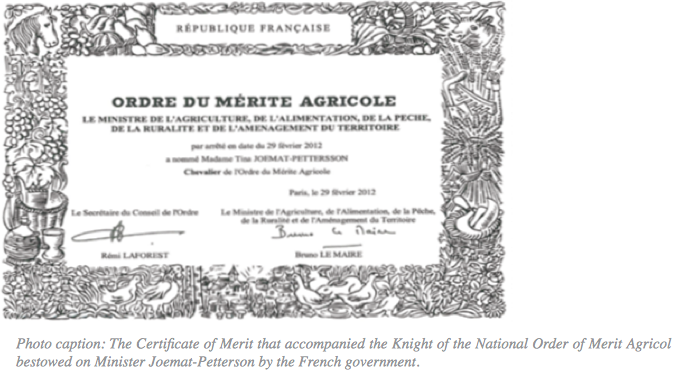
Next time you meet Tina Joemat-Pettersson, Minister of Agriculture, Forestry and Fisheries, you might want to give her the royal treatment.
This is because the government of France has bestowed on her the impressive title of Chevalier de l’Ordre du Mérite Agricole, meaning Knight of the National Order of Merit Agricol. The French Minister of Agriculture, Food, Fisheries and Rural Policy Bruno Le Maire conferred the title on her in recognition of “the services she has rendered to agriculture”.
The Minister is no stranger to awards. Last November she was named the best Agriculture Minister in Africa at an award ceremony hosted by Africa investor (known as Ai), a leading international investment research and communications group .
These awards acknowledge the Minister’s pioneering role in turning South Africa’s agricultural sector around.
More jobs
Minister Joemat-Pettersson has wielded her shining armour to help find more markets for the sector and to enable rural communities to engage more productively in small-scale farming and develop skills in the sector.
South Africa exports agricultural produce to new markets such as China, South Korea and Indonesia and has expanded its exports to other African countries.
Under the stewardship of Minister Pettersson, employment in the agricultural sector has increased by 8,8 per cent.
During her Budget Vote Speech in the National Council of Provinces in June, Minister Joemat-Pettersson announced that jobs in the agricultural sector had increased by 31 000 over the second half of 2011. In the first quarter of 2012, employment in the sector increased by a further 26 000.
Doubled value
“Since 1994, the value of our agricultural ex- ports has approximately doubled, after adjusting for inflation. With rare exceptions, agri-food exports exceed imports by a sizeable margin, meaning that agriculture makes an impressive contribution to South Africa’s overall trade balance”, Minister Joemat-Pettersson explained.
To support subsistence, smallholder and commercial producers, the Department of Agriculture, Forestry and Fisheries is implementing the Comprehensive Agriculture Support Programme (CASP).
According to the Minister, R2,6 billion was allocated and transferred to provinces to implement CASP for the period 2009/10 and 2011/12. This money was used to implement 2 863 projects countrywide, reaching 78 842 beneficiaries.
“These projects supported the entire spectrum of agricultural products by improving or providing required infrastructure for production and providing targeted training for beneficiaries. During the same period, 677 new extension officers were recruited country-wide”, the Minister said.
To date, 818 officers have registered with local universities for undergraduate degrees up to doctoral level. In addition, 36 586 farmers received accredited and non-accredited training on agricultural production and this resulted in the creation of 20 500 jobs.
Since 1994, the value of our agricultural exports has approximately doubled.... – Minister Tina Joemat-Pettersson
Gauteng talks technology to the youth
Gauteng talks technology to the youth sadminYouth matters
Gauteng talks technology to the youth
Lerato Mailoane - Gauteng Provincial Government
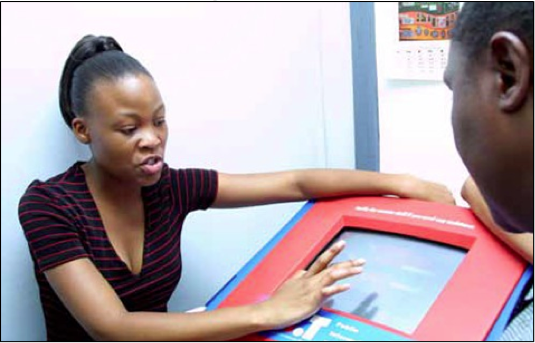
Photo caption: An assistant at the Thusong Service Centre in Soweto explains the new online service where young people can access government information
The Gauteng Provincial Government is living up to its status as the “smart province” by using technology to communicate employment information to young people.
You cannot communicate with the youth and technology-savvy young people without engaging with social media platforms, said Gauteng Premier Nomvula Mokonyane. “The Office of the Premier is now active on Twitter and Facebook – where we are getting a lot of feed- back from our communities on how to better serve them,” she said.
Roadshows
To this end, the provincial government is rolling out phase 2 of the e-Recruitment model, which includes electronic shortlisting, SMS notifications, report generation, an advertisement library, and an electronic and searchable database.
Those who cannot afford to access information online need not despair; the province will also engage with young people through youth consultations in all five metro and district areas. Mokonyane said the province is also planning an economic opportunities roadshow and is presenting programmes at the youth employment hubs.
In addition, other media platforms such as the provincial newsletter, Gauteng News, will be used to reach young people. “We will also ensure that we increase our communities’ participation in government programmes and plans by intensifying our open days at Thusong service centres across the province,” she said.
These steps will help the province to spread awareness of programmes such as the Youth Entrepreneurship Development Programme (Y-Age), which was launched in October last year. This programme seeks to recruit, select, train and fund new business ventures to create up to a million jobs in three years.
Jewellery skills
The Department of Economic Development will also work with the private sector to facilitate job creation and to finance BEE, tourism ventures and small businesses.
According to Economic Development MEC Qedani Mahlangu, her department, in cooperation with the University of Johannesburg, is working with a Swiss company, Watches of Switzerland, to establish a school that will offer training in the design of watches. Plans are already in place to send a group of young people to Italy in September to be trained in jewellery manufacturing skills. This programme is linked to the jewellery manufacturing precinct that will be based at OR Tambo International Airport.
To help young people apply for jobs in government, the province has also launched the Professional Job Centre at the Thusong Centre inside the Maponya Mall in Soweto. This brings government recruitment closer to the people in a popular shopping mall that attracts thousands of young shoppers.
For more information, call the Gauteng Department of Economic Development: 011 355 8000
Gauteng’s top athletes honoured
Gauteng’s top athletes honoured sadminSport
Gauteng’s top athletes honoured
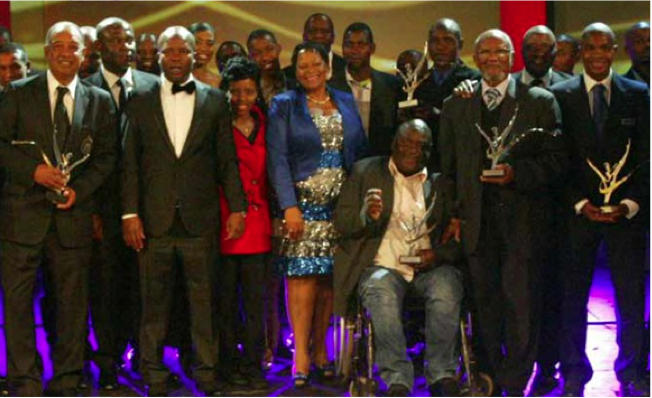
Photo caption: Some of the winners of the Gauteng Sports Awards with Gauteng Premier Nomvula Mokonyane (Photographer: Moses Nkosi)
Gauteng’s top athletes were honoured at the 2012 Gauteng Sport Awards during a glittering event at Emperors Palace in Johannesburg recently. Sportsmen, sportswomen and teams were awarded in 14 different categories.
Sportsman of the year: Francois du Plessis, cricket
Francois or Faf as he is known by his fans, made his under-19 debut for South Africa on the tour of England in 2003. He was chosen for the Pro- teas’ One Day International line-up during the 2010/11 season when he hit three centuries and made more than 500 runs in a 40-overs competition. He is one of the best all-round fielders in the country.
Sportswoman of the year: Pietie Coetzee, field hockey
Pietie Coetzee has represented the Southern Gauteng hockey team for more than 10 years and made her South African debut at the age of 16 and has broken the world record for the number of goals scored by an individual player. She has scored 200 international goals in 200 international matches and represented South Africa in two Commonwealth Games, three World Cups and two Olympic Games.
Sportsman of the year with a disability: Samkelo Radebe, athletics
Soweto born, Samkelo is an LLB Law student at the University of Johannesburg. He is a bi-lateral, below elbow amputee and represents South Africa in class T45 athletics. Achievements include UJ Sportsman of the Year, a gold medal at the 2011 International Paralympic Committee World Championships in New Zealand and two gold medals at the International Wheelchair and Amputee Sports Federation World Games in the Arab Emirates.
Sportswoman of the year with a disability: Bonita Blankenberg, motorsport
Bonita Blankenberg started with blind navigating at the age of 19 “for fun”, but today she is the reigning Regularity Rallying Blind Navigator Champion. After winning the 2011 championship, Bonita said, “I still have to remind myself that we won; it was a great feeling, especially since I had to work very hard to win it. For me, rallying was always just for fun, so it took quite a mind-shift to look at it from a competitive angle.”
Coach of the year: Ilse Laing, gymnastics
Ilse Laign has been national coach for the Proteas for the past seven years and is the head coach and owner of the JGC Gymnastics’s Club. In 2011, Laign coached the Junior Championships team, the World Cup team and the World Championships team in Belgium and Japan. Laing also achieved the highest qualification of Brevet Coach and is an international judge.
Most promising athlete: Shianne Addinall, water ski
At only 13 years old and specialising in bare-foot water skiing, Addinall excelled at the 2011 South African Championships u/17 in Kimberley and was awarded the title of most improved skier in South Africa for 2011. Her current rankings are second in Europe and Africa Junior, fifth in Europe and Africa all ages; seventh in the World Junior Section and 20th in the World.
Sport personality: Lucky Lekgwathi, football
Captain of Orlando Pirates Football Club Lucky Lekgwathi has done more than 100 league appearances for the team. He is the winner of the Premier Soccer League Title Champions 2010/2011 season, MTN Top Eight for 2010/2011, Nedbank Cup 2010/2011 and the Carling Black Label Cup 2011. Lucky was also named the MTN 8 Player of the Tournament in 2011.
Team of the year: Orlando Pirates, soccer
Orlando Pirates won the domestic league, the Nedbank Cup and the MTN 8 during the 2010/2011 season. They are the reigning PSL champions, MTN 8 Cup champions and the Telkom Cup champions and achieved a treble (winning three trophies in a single season) in back-to-back seasons.
Sport team of the year with disability: Kwa Thema Disability Club, athletics
Nine of the club’s members qualified to represent Gauteng in the National Games held in 2012. The club won six gold medals, four silver medals and four bronze medals at the IWAS Games in Europe in 2011.
Most promising team of the year: University of Pretoria (Tuks): football
The team achieved third place in the National First Division Inland Stream in the 2010/2011 season and they were winners in the 2011/2012 season. The club has produced a number of national performers, including Bongani Khumalo, George Maluleka, Andile Jali and Afcon winner Davies Nkausu of Zambia.
Technical official of the year: Zakhele Thusi Siwela, football
Zakhele provides refereeing services for the Premier Soccer League, South African Football Association (SAFA) and FIFA. He acquired FIFA Level 7 and was promoted from SAFA to FIFA. He enjoys recognition both nationally and internationally.
Administrator of the year: Senzo Mazingiza, football
General Manager of Orlando Pirates Football Club Senzo has contributed to the success of Orlando Pirates in the 2010/2011 season with his administrative strength. He has achieved the PSL Title Champions 2010/2011 season, MTN Top 8 winners 2010/2011, Nedbank Cup winner 2010/2011, and Carling Black Label Cup winner 2011.
Sport journalist of the year: Velile Mbuli
In 2008, writing for the SABC Sport info hub, Velile was working with 18 SABC radio stations providing sound bites, packages and interviews for 105 sports bulletins and 15 sports programmes on a daily basis. During the SAFA Annual Awards in November 2010, he won the SAFA Media of the Year Award in radio and in 2011, he addressed the FIFA Women’s Football Symposium in Germany during the Women’s World Cup.
HCT campaign a first for the farming sector
HCT campaign a first for the farming sector sadminHealth
HCT campaign a first for the farming sector
Howard Kgoa - Department of Health
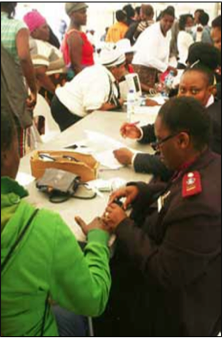
Photo caption: Farm workers are tested for HIV at Rashoop Skietbaan near Brits in North West.
Rashoop Skietbaan, some 10 kilometres north of Brits in North West, is surrounded by bustling farms that supply fresh agricultural produce to Brits and to places as far away as Pretoria, Vereeniging and Johannesburg.
Farmer Christo van der Merwe says they supply vegetables, dairy and meat products to these areas every week, thanks to an “army of dedicated workers”.
Van der Merwe is passionate about the provision of health services to his employees and has therefore made special efforts to transport them to be tested for HIV and AIDS on a regular basis. He also regularly attends meetings and outreach programmes called by the Department of Health.
“I want the department to bring in mobile clinics at least twice a week so that the farm workers do not have to travel far for medical help. It is costly for them and also, the production suffers in the process.”
He said there were more than 2 000 people working on farms around Brits. Van der Merwe and other farmers in the area were therefore delighted when Minister of Health Dr Aaron Motsoaledi, launched the first ever farming sector HIV Counselling and Testing (HCT) campaign at Rashoop Skietbaan in July. Over 1 000 farm workers from across Brits ar- rived at the venue to test and seek information on health matters in general.
After successfully spearheading HCT campaigns in other sectors such as mining and education, it has been the Minister’s expressed wish to launch the campaign for farm workers.
Access to treatment
According to the Medical Research Council, HIV and AIDS is the largest single cause of death in South Africa. The farming sector has to deal with additional challenges, including inaccessibility of farms, high illiteracy rates and lack of basic services.
According to the NGO AgriAIDS, 39,5 per cent of South Africa’s half a million farm workers are infected, which is well above the national rate of 18,1 per cent.
The department will provide HCT services in public and private facilities, including homes, workplaces and public spaces. The campaign ensures that people have access to treatment and care, as well as support for living with HIV and AIDS. HCT campaigns provide:
• mass access to voluntary HIV counseling and testing
• information, education and mass mobilisation
• detection and management of sexually transmitted infections.
Healthy living
One of the farm workers, Simon Rakudu, who attended the event, said he was very happy about the campaign. “I want government to conduct outreach programmes in farms so that they can understand the conditions of the farm workers, particularly on health matters.” Speaking at the launch, Minister Motsoaledi told farm workers that the campaign would open doors to healthy living. “… When you go for testing, you will also be tested for other lifestyle diseases such as hypertension, diabetes and cancer.” However, the Minister added it was disheartening that South Africa was the highest consumer of anti-retrovirals.
Urging farmworkers to get tested, Minister Motsoaledi said, “Know your HIV status, so that if you are negative, you remain negative, and if you are positive, you go to your nearest clinic or hospital for help.”
Typical of a leader who leads by example, Minister Motsoaledi, soon after finishing his speech, dashed to the testing booths to be tested himself.
It is hoped that farm workers as the back- bone of the economy, will heed the message and test for HIV.
Heart-warming switch-on for Godidi village
Heart-warming switch-on for Godidi village sadminRural development
Heart-warming switch-on for Godidi village
Chris Bathembu
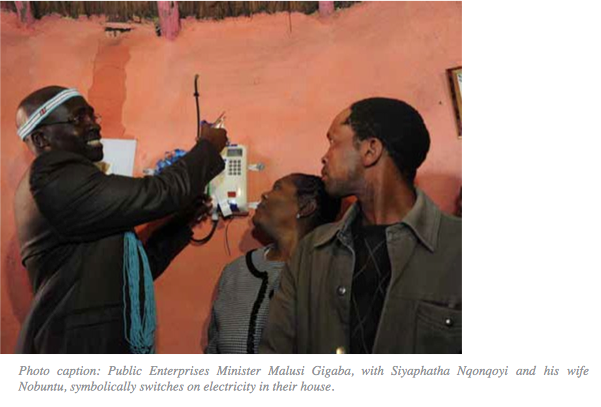
It was a heart-warming moment for residents of a small Eastern Cape village when they could enjoy the benefits of electricity for the first time. Government officials and power utility Eskom switched on a new electricity substation at Godidi village, outside Butterworth, signalling an end to unsafe paraffin stoves and candles.
The landmark moment also marked the switching on of lights to the four millionth electrified home in South Africa since 1991. “Our goal is to achieve universal access by 2020; there should be no home in South Africa that does not have electricity,” said Eskom CEO Brian Dames.
”Eskom is a state-owned company and we have a clear purpose and that is to provide electricity to the rest of South Africa so that our economy can thrive and to improve the quality of life for our people,” Dames said.
He added that what Eskom had done for the residents of Godidi was a commitment “to reach even the most remote parts of our country”.
“What we are hoping now is that this community can appreciate and realise the advantages of having electricity. We’ve now done four million households and our plan is to have everyone electrified by 2020,” said Dames.
Significant achievement
Public Enterprises Minister Malusi Gigaba led a crowd of about 500 villagers in a joyous moment of history as he switched on the lights at the home of 36-year-old Nobuntu Nqonqoyi, mother to an eight-month-old baby.
He said having four million households connected to the national grid was a milestone for a country that was celebrating 18 years of democracy. “It’s a significant achievement … the job is not done yet; we have a mammoth responsibility to connect all South Africans,” Gigaba said.
He urged the new electricity recipients to conserve energy reminding them that wasting energy would not only affect them but the entire country. “Do not just indulge in this newly found gold, remember you pay for electricity, so don’t waste it because if you waste it you will also affect other South Africans who depend on the national grid.”
Local residents said the lack of electricity had long been an obstacle for education and economic opportunities, which led to poverty and unemployment. They hoped that the provision of electricity would improve their quality of life and bring about new economic opportunities.
“I can’t explain the joy I’m feeling. I’ve just had a baby and you can imagine the struggle of not having electricity. It’s winter and the baby requires a warm bath and a warm bottle all the time so my life will be much easier,” Nqonqoyi said.
She told Gigaba that even though she was still “scared” of electricity; her family was excited at the idea. “I am nervous because I’ve never been exposed to electricity before, but I will get used to the idea and I’m very excited.” For 72-year-old Nolusapho Jaji, having electricity meant owning a television set. “We used to have TV when I was staying in Mthatha, but when we came here it meant that we had to use a battery and that did not work for long, so I’m excited beyond words.”
Business growth
Shop owner Sgidi Mankazana said his business would soon be booming. “I can now keep my shop open until late because without electricity I would close very early - as soon it became dark because I was scared I might fall victim to criminals,” he said. He will also be able to sell electricity to the locals and this means growth for his business.
Authorities say for the initial phase of the programme, 500 households have been electrified but the substation has the capacity to accommodate 10 000 more customers.
“It’s an ongoing programme, it doesn’t stop here; our target is to have 894 new megawatts this year and the number is expected to be doubled in the next financial year, so we are busy,” said Minister Gigaba.
For more information or to report power failures, call Eskom’s sharecall number: 08600ESKO M (0860037566)
Helping women feed the nation
Helping women feed the nation sadminKnow your Minister
Helping women feed the nation
Thomas Thale
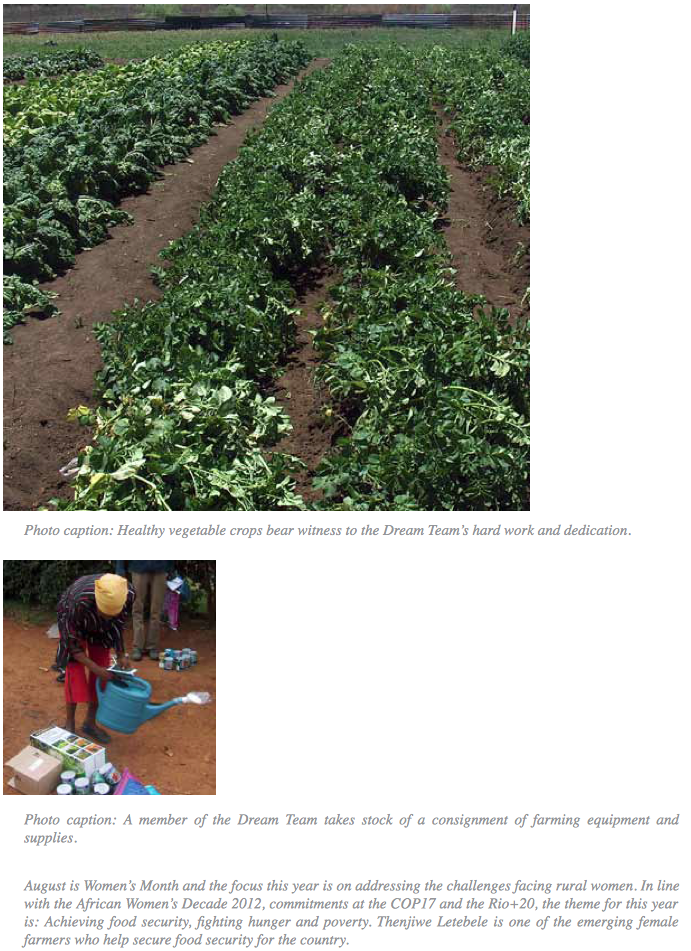
When Thenjiwe Letebele retired from Jet Stores in 2002, she used her pension payout to buy a farm in Oudedorp, 10 kilometres outside Potchefstroom in North West. In her 20 hectares plot, she planted green peppers, carrots, green beans and pumpkins.
She also built a broiler to raise 200 chickens, and was soon supplying vegetables and chickens to locals and the nearby Overland supermarket.
Demand for her products grew and within six months, she approached the Department of Agriculture, Conservation and Environment in the province to help grow her business. The department helped her by building a broiler house that holds 1000 more chickens.
Dream team
Business continued to grow and in 2006, she joined up with four others to form the Dream Team Cooperative. The cooperative is made up of three women, one man, three youths and one disabled person. With growth came more resources and, in 2008, the Department of Agriculture in the province gave her two extra broiler houses that hold 2000 chickens each plus three vegetable panels.
Today, the cooperative supplies vegetables to the local Fruit and Veg, and to Overland, a local supermarket. The cooperative also sells vegetables and chickens to members of the public.
Letebele is one of the heroic women who help provide food security for the country. Food security is a huge global challenge, and women are increasingly recognised for their crucial contributions in agriculture and rural enterprises in all developing country regions, as farmers, workers and entrepreneurs. South Africa is no exception. Worldwide women produce more than half of all the food that is grown, and in Africa it is 80 per cent.
Victor Motlogelwa, Deputy Director of Field Services in the Kenneth Kaunda district of North West says that women comprise half of the 1 500 farmers who receive help from the department. “This includes commercial, emerging and subsistence farmers. We give them agricultural support. In the majority of cases, people simply need technical advice on crops, chickens, livestock or piggery. Some need to venture into the business for the first time. We put them in touch with people who have expertise in that area, such as the Agricultural Research Centre, the Pork Producers Association or economists based in Mahikeng.”
Motlogelwa describes the Dream Team Cooperative as “the best performing group in our area.”
Local Development Centres
In the current financial year, the department has funded 21 farmers in the district.
Motlogelwa says farmers who need funding should go to the Local Development Centres to apply.
“We first do an analysis of their project and help them draw up a business plan, which we send to our economists in Mahikeng as a concept document. The decision on who gets funding is made by a committee that sits in Mahikeng to adjudicate applications from all districts in the province.”
Letebele is one of the farmers who passed the test. She is jubilant about her achievement. “This farm has enabled me to help unemployed people. I have four permanent staff members. We also employ casual workers for harvesting,” says Letebele.
For more information, contact the North West department of Agriculture: 018 299 6648
Higher education funds go higher
Higher education funds go higher sadminEducation
Higher education funds go higher
Gabi Khumalo
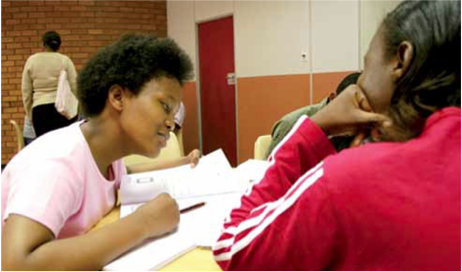
Photo caption: Many FET college students who perform well academically will no longer have to pay tuition fees.
Many tertiary students from poor backgrounds struggle to keep up their studies due to increasing tuition fees.
However, this will soon change as Minister of Higher Education and Training Blade Nzimande has promised that funding for poor students and those who perform well academically will continue to grow every year.
Minister Nzimande was speaking at the recent COSATU Education and Skills Conference on “Critically engaging the current education and training landscape: government’s transformation agenda.”
Easing the burden of the poor
According to the Department of Higher Education and Training, funding grew from R2,375 billion in 2008 to R6 billion in 2011. Many Further Education and Training (FET) college students, who would normally have qualified for a loan from the National Stu- dent Financial Aid Scheme of South Africa (NSFAS), now no longer have to pay fees and in many cases, they can also get their accommodation or transport subsidised.
The department has to date put in place a number of initiatives costing billions to alleviate the burden of fees from poor parents and students. “Loans and bursaries administered
by NSFAS have been expanded substantially over the last three years and this has contributed immensely in assisting academically deserving and poor students,” the Minister said.
He said he was fully committed to the introduction of “fee-free” education for the poor becoming a reality sooner rather than later, as well as improving the living and learning environments for students at higher education and training institutions. Ways of addressing these challenges are being explored by the funding review committee.
However, the Minister emphasised that tuition fees charged by higher education institutions were determined by individual university councils and not by the Ministry.
Minister Nzimande also addressed the skills shortage. He said the continued growth in new artisan learners was essential if the country was to succeed with its strategic infrastructure projects and all the fringe industries that would grow to complement them.
He said the number of new artisan learners was increasing again after a long decline from the mid-1980s.
“The number of people passing their trade tests to qualify as artisans has more than doubled in the last four years, from 6 030 in 2007/08 to 13 168 in 2011/12,” the Minister noted.
Workplace experience
On the issue of workplace experience, he urged employers to provide workplace-based training opportunities.
“An important feature of our skills development policies is our emphasis on expanding workplace-based training opportunities to complement classroom-based education. Many programmes require learners to have experience in workshops, as well as in workplaces in order to qualify,” said Minister Nzimande.
“Workplaces that are prepared to accept learners are often in short supply. One of the most important thrusts is ensuring that more employers provide opportunities for apprentices, learners interns, cadets and articled clerks, among others.”
For more information, call the Department of Higher Education and Training Call Centre: 0800 872 222; or send an e-mail to: callcentre@dhet.gov.za
Infrastructure development key to Africa’s success
Infrastructure development key to Africa’s success sadminInfrastructure development
Infrastructure development key to Africa’s success
Writer
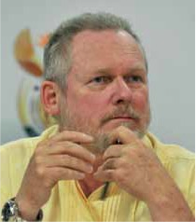
Photo caption: MInister of Trade and Industry Rob Davies.
African countries must upgrade their infrastructure, integrate their markets and diversify the products they produce to sustain their growing economies, says Minister of Trade and Industry Rob Davies.
Addressing the Mainichi Forum of the Southern African Development Community (SADC) in Tokyo, Japan, recently, Minister Davies commended Africa for being one of the fastest growing economic regions in the world today.
He said the average growth of the African continent was estimated to be 5,8 per cent, in contrast to the European Union, which has gone into recession and the United States, which is constrained by the low level of economic growth.
“In fact, after Asia, the African continent is increasingly widely recognised as the next Davies attributed the continent’s impressive economic growth to sound financial institutions and the willingness to engage politically. “There has been significant and sustained growth across the continent driven in part by the boom in mineral commodities, but also by growth in retail, agriculture, transport and telecommunication.
“We do not have governments in Africa that are struggling with huge debt crises because of the recession; we have resolved a number of political crises and we have better economic governance on the African continent.”
Trade and investment
Minister Davies was in Japan on an official visit to promote trade and investment ties between South Africa and Japan. Trade between the two countries has increased slightly from R87 billion in 2007 to R90 billion in 2011.
During his visit, the Minister met with various investors, including Isuzu, Toyota, Nissan, Japan Bank for International Corporation, Mitsubishi, UFJ Bank, and the Japan External Trade Organisation.
The SADC Mainichi Forum is one of the resource capacity, infrastructure development and investment.
The SADC Mainichi Forum is a partnership between the 12 SADC member countries and the Mainichi Newspapers Company. It is intended to boost the Japanese private sector and expose it to the trade and investment opportunities that exist within SADC member countries.
To take full advantage of such partnerships, warned Davies, Africa must address challenges of inadequate infrastructure, small and fragmented markets and inadequate diversification of industrial output.
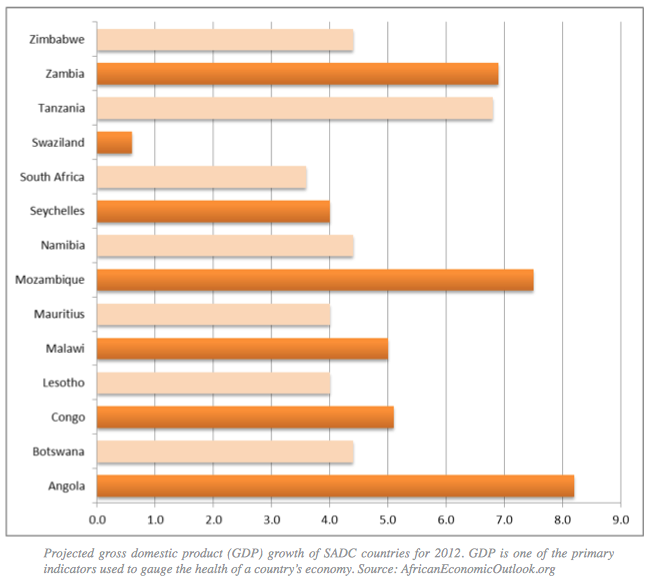
International Labour Organisation tackles youth employment
International Labour Organisation tackles youth employment sadminInternational relations
International Labour Organisation tackles youth employment
SAnews.gov.za
Up to 75 million young people be- tween the ages of 15 and 35 are facing the crunch of unemployment and under-employment world-wide. This is according to the International Labour Organisation (ILO), which recently held its 101st Session of the International Labour Conference in Geneva.
“This means that ... young people are not contributing to the fiscus [the state’s income] through taxes and helping to grow the economy,” said a statement issued by the South African Department of Labour.
The department said these were some of the challenges that the ILO was grappling with at the Geneva conference.
“The crisis means that instead, it is the responsibility of governments to ensure that there is a social protection and support for those who are out of employment.”
Free basic education
Recommendations from the ILO include time-bound national youth action plans for employment, credible commitment to tack- ling the challenge of lasting youth employment, coordination of key players around a common platform of action and youth employment policies that address not only unemployment, but also focus on quality of jobs for youth.
The ILO further suggested that on a long-term basis, governments should ensure free quality basic education as a durable solution to youth unemployment.
It said focus should also be placed on policies that strengthen the link between education and training systems and the workplace to address the mismatch between educational outcomes and labour market requirements.
Labour Minister Nelisiwe Oliphant, who attended the conference, has pledged government’s commitment as part of South Africa’s obligation to create jobs and grow the economy.
One of the interventions that is spearhead- ed by the Department of Labour is the series of Jobs Fairs in different parts of the country.
“This is an opportunity for employers to meet potential employees. It means we are responding to the matching of skills with the needs of the labour market and thereby helping in mitigating the rife unemployment, especially among young people,” Minister Oliphant said.
The ILO also recommended that more focus should be placed on giving a second chance to early school leavers and those who never had educational opportunities.
Social partners are also urged to develop strategies to promote youth entrepreneur- ship and business development, such as making finance and mentors more accessible. In addition, entrepreneurship curricula should also become part of early education.
Interns help heal the health system
Interns help heal the health system sadminHealth
Interns help heal the health system
Gabi Khumalo
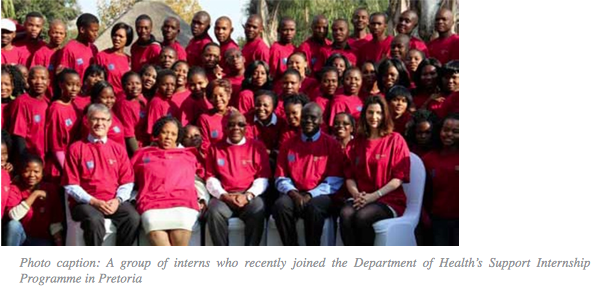
Like many young graduates, Kgopotso Shayi from Bushbuckridge in Mpuma- langa struggled to fi a job even though she holds a certificate in Management
and Technology.
Shayi, who applied for jobs ever since she graduated in 2009, started thinking she would never get an opportunity to use her skills.
“At one point I sent an application to one of the local shops, but they told me I was over-qualified. People who didn’t further their studies after Grade 12 were laughing at me asking what was the point of studying if I went back home and did nothing,” said 27-year-old Shayi. This motivated her to prove to those who laughed that perseverance would eventually pay off.
An advert by the Department of Health posted in December last year caught her attention. It called for unemployed graduates with qualifications in finance, commerce, accounting, human resources and information communication technology, to do internships at health facilities. “I didn’t waste time to send my application. I was then shortlisted and called for an interview, which went well, so now things are looking up for me.”
Provincial offices
Shayi is among 400 interns who came from all over the country to Pretoria to join the department’s Support Internship Programme. They were divided into three groups and deployed to the department’s provincial offices, where they are helping the department to improve the healthcare system and to get a clean audit this financial year.
Launching the Support Internship Programme, Health Minister Dr Aaron Motsoaledi said most of the challenges provinces encountered were in the areas of fi management, procurement and human resources.
The interns have been selected to provide additional assistance in the areas of asset management, revenue collection, supply chain management, PERSAL clean-up and information management, among others.
Capacity building
In June, the department recruited 70 unemployed graduates with degrees and honours degrees in chemistry and chemical engineering to help in forensic toxicology*, where there is a backlog.
“All interns have undergone a capacity building programme for a one-month period.
The aim was to skill them further prior to their deployment to the various provinces,” Motsoaledi explained.
The areas identified as key to their development include an understanding of how the public service operates; financial management in the public sector; the use of human resource information in planning, and the district health information system.
The department plans to assign 15 interns per category to each province for a year. They will get a stipend of R3 500 per month.
R84 million has been allocated for the programme, which will also include accommodation and transport.
“I will work hard and try to learn more about the department. Hopefully, my presence and skills will bring change and help improve the health system,” Shayi said.
* Forensic toxicology is the application of toxicology for the purpose of law. Toxicology is the study of substances, such as poisons, that are harmful to human beings. Toxicologists have the responsibility of finding and identifying the presence of drugs and poisons in fluids, tissues and organs.
For more information contact the Department of Health: 012 395 8000
Meet Minister Tina Joemat-Pettersson
Meet Minister Tina Joemat-Pettersson sadminKnow your Minister
Meet Minister Tina Joemat-Pettersson
Tina Joemat-Pettersson has held the portfolio of Minister of Agriculture, Forestry and Fisheries since May 2009 and has been a Member of the National Executive Committee of the ANC since December 2007.
Other positions held by Minister Joemat-Pettersson include Chairperson of the Northern Cape Province Rehabilitation Trust, Chairperson of the South African Communist Party and the ANC Women’s League in the Northern Cape, trustee of the Desmond Tutu Diversity Trust and member of the Northern Cape HIV and AIDS Council.
A passion for education since her youthful years has shaped her role as an activist. As a member of the Azanian Students Organisation during the 1980s, she was an enthusiastic student activist. From there, she moved to become a National Representative for SADTU in the Northern Cape in 1992.
As a stalwart for education Minister Joemat-Pettersson has continued to be a member of the Executive Council for Education since 2003, she is a Trustee of the Education Development Trust, a member of the Democratic Teacher’s Union and is the Acting President of the Association of University English Teachers in South Africa.
New champion for African unity
New champion for African unity sadminInternational relations
New champion for African unity
Chris Bathembu and Thomas Thale
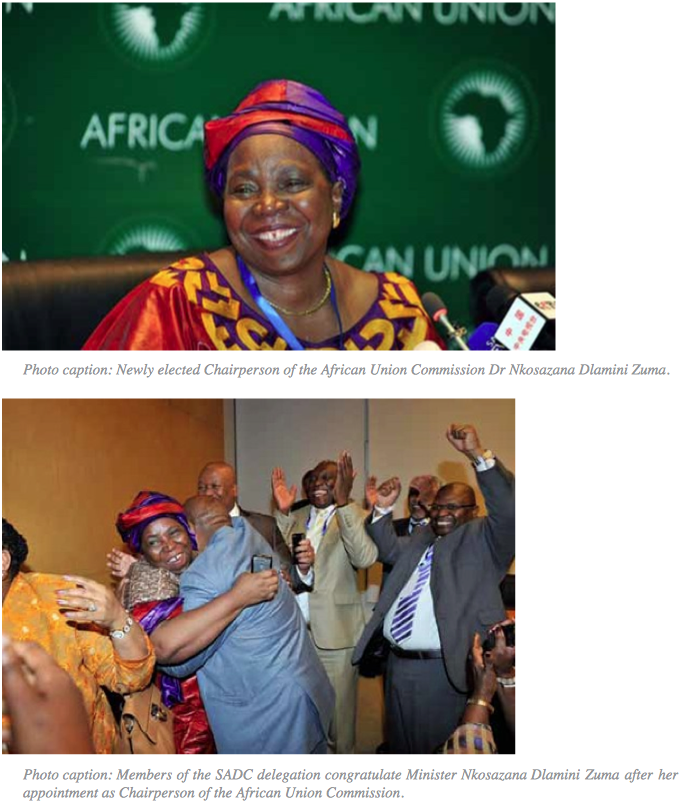
In October, Home Affairs Minister, Nkosazana Dlamini Zuma will pack her bags and head for Addis Ababa, where she will be based for the duration of her four-year tenure as Chairperson of the African Union Commission (AUC).
In this important position, she will be the engine that makes the AUC work. In view of the work she has done in turning around the Home Affairs department and her previous superb record in the Ministry of International Relations and Cooperation, many South Africans were not surprised that 37 African Heads of State and Government decided that she was fi to lead the AUC.
The commission is the secretariat of the Pan African Parliament, responsible for implementing the decisions and policies of the AU, proposing legislation and for the daily running of the AU.
The commission is a huge structure, with nine directorates headed by different commissioners. These are Peace and Security, Trade and Industry, Rural Economy and Agriculture, Infrastructure and Energy, Political Affairs, Economic Affairs, Human Resources, Science and Technology, Legal Counsel and Social Affairs.
Minister Dlamini Zuma thus has her work cut out for her. She was not victorious after being elected Chairperson, but chose her words carefully.
Taking the continent forward
“I believe no one individual can make a difference. I believe even in my own ministry that I’m as good as my team, so it’s very important to develop and to have a team spirit so that you can rely on your team. Yes, I’ll be a leader of a team, but I’ll be as good as my team”.
She reached out to all AU member countries, including the outgoing chairperson, saying she would draw on his counsel. She is conscious that to lead the organisation effectively, she will need the cooperation of the entire continent.
“I am aware that I shall only be able to dis- charge this responsibility by working with all member states and the talent that exists in our continent.”
Taking the continent forward
Describing what she aims to achieve at the helm of the AUC, Minister Dlamini Zuma humbly stated that she would, “continue to build on the work of those who came before us and we will continue to work with regional bodies around the world, the UN and all its agencies, including all our cooperating partners to ensure they can contribute in helping us to achieve our collectively defined priorities.
“… Africa must therefore take its rightful place among nations of the world as an equal reliable partner, and full member of the international community”, she added.
The AUC was set up to work for the common good of the AU as a whole. Aware of this, Dlamini Zuma said, “I think what is important now is to say we are here to unite around the programmes and see how we can implement those programmes united towards a common goal together. My view is that I’m an African citizen, I am loyal to the African Union and I will serve the African Union.”
As a first female chairperson of the AUC she was complementary to the AU for opening up opportunities for women.
“I would like on behalf of all the women of our continent to thank the heads of state for putting women for the first time in this position and also to say the work only starts now. I will need a lot of support from all my sisters and brothers.“.
New court brings justice to Bloemhof’s doorstep
New court brings justice to Bloemhof’s doorstep sadminSafety and security
New court brings justice to Bloemhof’s doorstep
Sinenhlanhla Mkhwanazi - Department of Justice and Constitutional Development
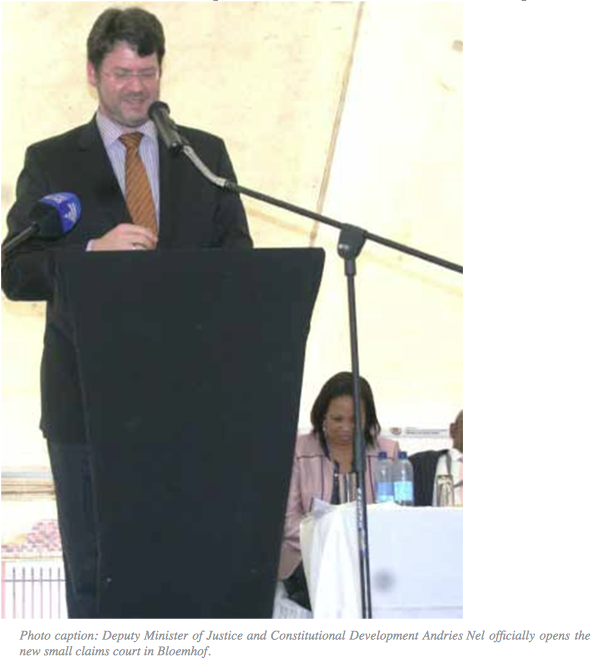
The people of Bloemhof in North West can now settle disputes over money in their own local court. The new small claims court in Bloemhof, which was recently opened by the Deputy Minister of Justice and Constitutional Development Andries Nel, makes it possible for residents to lodge claims of up to R12 000 right on their doorstep.
Eager to welcome the new facility into their midst, community members flocked to the Boitumelong Community Hall to attend the opening ceremony.
The new court is part of the department’s commitment to ensure that there is an established and functional small claims court in each of South Africa’s 384 magisterial districts. This commitment has been enhanced by last year’s renewal of a partnership between the department and the Swiss government worth R10 million over a four-year period.
The right to justice
Addressing the community, North West Regional Head Tsietsi Malema said, “We have a Constitution which clearly indicates that everyone has the right to access jus- tice. Our department is fulfilling that right by launching the Bloemhof Small Claims Court today.”
The Deputy Minister echoed these sentiments. “I have been informed by the North West Regional Office that they are earnestly at work to ensure that small claims courts are established in the remaining nine magisterial districts by the end of this year.”
He said small claims courts were powerful mechanisms, which provided access to justice, especially to the poor based on speed, simplicity and cost effectiveness
Functions of the court
North West Legal Services Director Raesibe Tladi briefly explained the functions of the small claims court. “Anyone except companies, corporations or associations may institute a claim at the court, but persons under 18 must be assisted by a parent or legal guardian.”
He explained that people could only claim an amount not exceeding R12 000 at the small claims court. If the claim exceeded this amount a person could institute a claim for a lesser amount in order to pursue a case in this court.
“You don’t need a lawyer to institute a claim in a small claims court, legal assistants and clerks of the court will assist you free of charge. The best part is that you can speak in your own mother tongue in court and we have interpreters to help,” Ms Tladi said.
Community members were delighted to hear about these services. One resident, Mr Moliegi Malatji, remarked that it would make life much easier for them. “I have a problem that needs to be resolved at a small claims court and with the opening of this court, I will certainly get assistance.”
Small claims courts are powerful mechanism, which provide access to justice, especially to the poor based on speed, simplicity and cost effectiveness.
For more information about small claims courts, call the Department of Justice and Constitutional Development: 012 315 1111 or visit their website: www.justice.gov.za
Opening the door to a better future
Opening the door to a better future sadminEmployment news
Opening the door to a better future
SAnews.gov.za
Choosing a career path is one of the most important decisions that learners can make before leaving school. Learners should therefore ensure that they take the right combination of subjects that will open the door to opportunities after they leave school.
In a bid to help learners identify the career paths best suited to their abilities, the Gauteng Department of Education has introduced a career counselling and education programme for secondary schools.
Provincial Education MEC Barbara Creecy said the programme, which has been designed for Grade 8 and 9 learners, works with teachers, learners and their parents to jointly identify the career paths that best match the learner’s abilities, interests and goals.
“We all know how important choosing a set of subjects in Grade 10 is for completing matric
and pursuing an education or work opportunity, when you leave school. The programme focuses on empowering learners and parents to choose the right combination of subjects that will open opportunities after they leave school,” the MEC said.
Choices
MEC Creecy, who was speaking at the recent Soweto Learner Summit, noted that through schools, government provided choices to deter- mine a learner’s future. It does this by offering a number of services and interventions to ensure that they successfully develop their potential, talents and skills.
The department also offers learners in Grade 10 the option of choosing between completing a general National Senior Certificate or a Technical and Vocation National Senior Certificate. This will give Grade 9 learners the choice of going to a FET college to follow a vocational path or going to a technical high school to follow an intensive maths, science and technological direction. “To ensure that learners are successful, we are providing supplementary education programmes on Saturdays and school holidays.
The programme focuses on complementing the work done in schools by providing additional tuition and materials in 10 subjects, where the provincial failure rate is the highest,” the MEC said.
Digital and audio-visual
The programme also includes digital and au- dio-visual materials, study guides and career education material.
Encouraging learners to do their best, the MEC assured them that government was working at all levels with communities and families to make it possible for them to get the best education.
“I expect you to get serious this year. I expect you to put your best effort into everything you do; I expect great things from each of you... so, don’t let us down,” she said.
“Do not let your family or your country or yourself down... make us all proud. I know you can do it”
Reading their rights in Braille
Reading their rights in Braille sadminSafety and security
Reading their rights in Braille
Sinenhlanhla Mkhwanazi
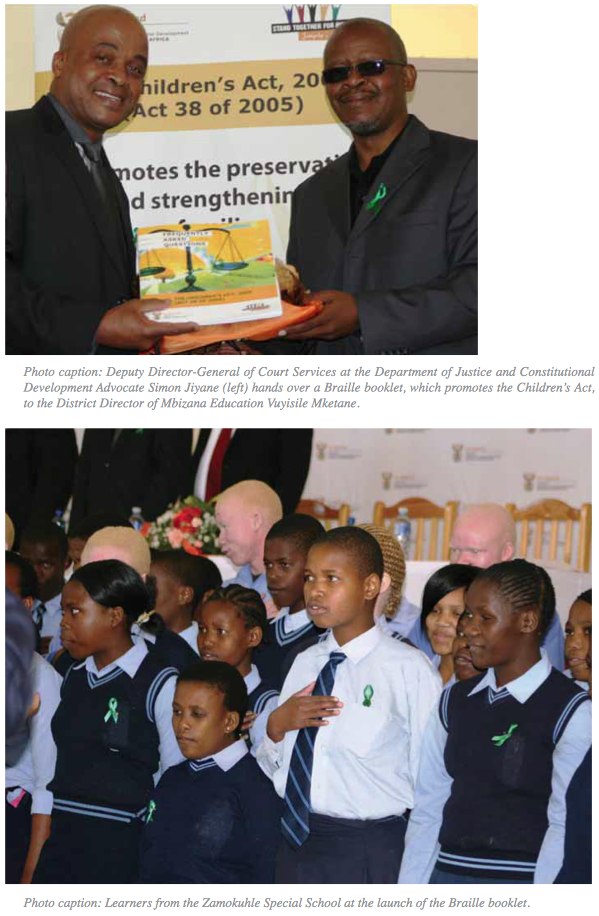
This year’s Child Protection Week presented an ideal opportunity for the Department of Justice and Constitutional Development to launch its first ever Braille booklet which promotes the Children’s Act. It is aimed at raising awareness of children’s rights among visually impaired and partially sighted children. Parents and the community of Mbizana in the Eastern Cape attended the official launch of the Braille booklet at the Zamokuhle Special School.
The school has 30 blind and 135 partially sighted students. In the past few years, the school had a high matric pass rate, achieving a 100 per cent rate in 2009.
“What the department has done shows that they really care about us and this is also a testimony that we are not forgot- ten,” said the principal of the school, John Aracaermpil.
Sifiso Njilo, a learner from the school, was the first to be chosen to read from the booklet for guests at the event. “I am so happy to be the first learner to read this booklet and I think it will be very useful to us,” an excited Sifiso said.
Guests who attended included members of the judiciary and officials from Mbizana Local Municipality, the departments of social development and of basic education and, the South African Police Services and the National Prosecuting Authority. Learners entertained them with Xhosa traditional dances and performed a drama depicting child abuse and how the court could help an abused child to find a better home.
The Braille booklet provides information and answers various questions for children, including those relating to sexual abuse, where to find children’s courts, what matters can be taken to children’s courts and what is a Foster Care Order? The booklet consists of written responses in plain language.
SADC acts to revitalise tertiary education
SADC acts to revitalise tertiary education sadminEducation
SADC acts to revitalise tertiary education
Gabi Khumalo
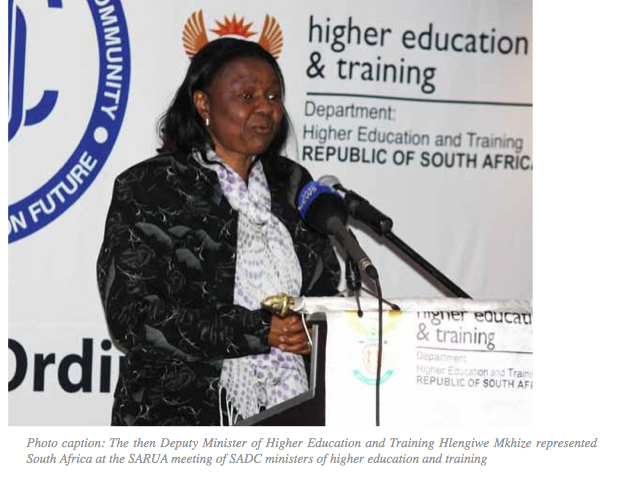
Plans are underway to source funding and revitalise higher education across the Southern African Development Community (SADC) region.
This follows a critical report tabled by the Southern African Regional Universities Association (SARUA) at a two-day meeting of SADC ministers of higher education and training. Held in Joburg recently, the meeting established a technical committee to implement recommendations that came out of the discussions. The committee will plan a strategy to raise funds and organise a regional higher education donor conference.
The report looked at factors that hamper the development of higher education in the region. Recommendations in the report include the development of staff and students, increasing the number of doctoral graduates, increasing the research output and modernising the higher education system through Information Communication Technology infrastructure and more effective higher education planning.
Clear policy vision
The two-day meeting hosted by South Africa in July, was aimed at formulating a clear policy vision for higher education. Discussions revolved around the status and challenges of the sector based on the work that had been undertaken by SARUA.
SARUA was established to assist in the revitalisation and development of the leadership and institutions of higher education in the SADC region. Its goal is to en- able the regional higher education sector to meaningfully respond to the developmental challenges it faces.
Presenting the report, CEO of SARUA Piyushi Kotecha warned that without significant change, the SADC region would not achieve acceptable enrolment rates.
“Southern Africa has an enrolment rate of 6,3 per cent, which compares poorly with tertiary enrolment in other parts of the world. Higher education enrolment just managed to keep pace with population growth, apart from Mauritius and South Africa, where tertiary enrolment increased by 20 per cent and 15 per cent respectively over the last 20 years,” Kotecha said.
Zimbabwe
The report noted that while the SADC had spent more on education between 1990 and 2010 than any other region in the world this spending was very uneven with increased demand not being met by increased levels of funding.
Sharing his country’s experience, Zimbabwe’s Deputy Minister of Higher Education and Training Senator Lutho Tapela said the country had made significant strides in creating opportunities for students striving to obtain higher education.
Zimbabwe, with a population of 12 million, is second in terms of literacy rates in Africa. “The University of Zimbabwe has established a stellar education programme through Indian government assistance. Over 15 colleges could at some point become institutions offering degrees after being mentored by well-equipped institutions.”’ Tapela said.
“We also offer bridging courses for students who don’t meet some higher education requirements to enter certain programmes. The technical and vocational training participation in higher education by the private sector is critical in national development”.
He added that Zimbabwe also participated in intergovernmental cooperation, taking part in exchange programmes where science teachers are trained in Namibia and doctors in Lesotho.
Funding
South Africa’s then Deputy Minister of Higher Education and Training Professor Hlengiwe Mkhize highlighted the need to explore new ways of funding education. Suggestions included graduate work schemes, which would allow graduates to repay their study fees after they had started working.
“We also need to examine differentiation of our higher education system to meet the different needs of our people,” Mkhize said.
“A differentiated system ranging from research universities of technology and technical and vocational education and training colleges, with diversified programmes, will go a long way in meeting the diverse educational aspirations of our communities.”
African Development Bank representative Frank Boahene warned that government could not do everything on its own and challenged parents and the private sector to assist.
“If you believe that education is the key then invest in your child’s education,” he said, adding that the private sector often complained that it did not get the skills it required.
African Development Bank representative Frank Boahene warned that government could not do everything on its own and challenged parents and the private sector to assist.
“If you believe that education is the key then invest in your child’s education,” he said, adding that the private sector often complained that it did not get the skills it required.
For more information, call the Department of Higher Education and Training Call Centre: 0800 872 222.
Sediba residents reclaim their dignity
Sediba residents reclaim their dignity sadminRural development
Sediba residents reclaim their dignity
Writer
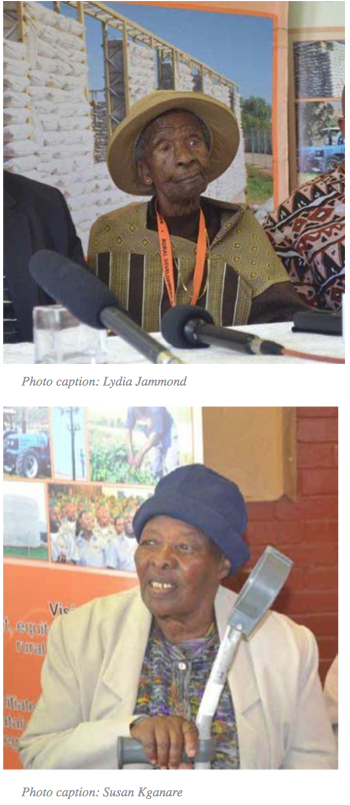
“We have finally been given our freedom back after suffering for so many years,” said an overjoyed Sediba resident after the community received a land settlement cheque at a special ceremony recently.
Rhe dignity of 511 families from the Sediba community of Thaba Nchu in the Free State was restored when they became the beneficiaries of land claim. The families received financial compensation for their land from the Minister of Rural Development and Land Reform, Gugile Nkwinti, during a hand-over ceremony in Thaba Nchu.
Handing over the cheque to the value of R42 million, Minister Nkwinti said 511 households would benefit from this financial settlement. “This compensation is in line with the ethos of the provision of the restitution of land rights,” he added.
The settlement celebration was also attended by the Deputy Minister of Rural Development and Land Reform, Lechesa Tsenoli, Free State Premier Ace Magashule and various MECs from the Free State.
Reserves
Sediba Reserve is one of three reserves in the Free State that were established in terms of the Native Land Act No.18 of 1913. The others are Thaba Nchu Reserve and Witsieshoek Reserve.
Outside these reserves blacks could not buy or rent land and neither could they acquire the right to land inside the reserves.
The Sediba Reserve claim was lodged by Mr Tau Meshack Motsalane on behalf of the Sediba community on 27 February 1997.
The claim was accepted and gazetted by the Regional Land Claims Commissioner for the Free State and Northern Cape on 19 October 2007.
Minister Nkwinti said this was the second phase of financial compensation for the Sediba communities. “The first phase saw 219 house- holds sharing R18 million. The third and final phase is coming and will see 500 households sharing R60 million.”
Since 1998, 300 land claims had been lodged in the province. Minister Nkwinti reminded all claimants to provide the traditional council with identification documents in order to receive payment.
Recipients could not hide their delight and gratitude when the Minister handed over their cheque.“We thank government so much,” said resident and claimant Susan Kganare, 68. “We have been through a lot. The apartheid regime made us suffer in a terrible way.”
Wishing to share her experience with today’s youth, Kganare urged the youth to take education seriously. “No one is going to make it in this lifetime without being educated. Our children must be aware that without education you are nothing.”
Kganare said they would use the compensation to ensure a better future for their children. “With this compensation we will take our children to school and make sure that they get a good education so that they can become future leaders.”
Another claimant, Lydia Jammond, who was born and bred in Sediba, said, “I thank government a hundred-fold for the changes that have been made…”
A joyful Jammond added, “It is a great day for me, I am so excited, but it is also painful because this thing is happening to us at a very late stage of our lives; most of my contemporaries have passed on, but I’m fortunate, at least I can see these beautiful things our government is doing for us…”
We thank government so much. We have been through a lot. The apartheid government made us suffer in a terrible way. – Susan Kganare
For more information, contact the Free State Regional Land Claims Commissioner Tel: 051 403 0700; Fax: 051 430 3930 Address: SA Eagle Building 7th Floor, 136 Maitland Street, Bloemfontein 9300. Postal Address: PO Box 4376, Bloemfontein 9300.
The Mid-Term Review: taking stock
The Mid-Term Review: taking stock sadminThe Mid-Term Review: taking stock
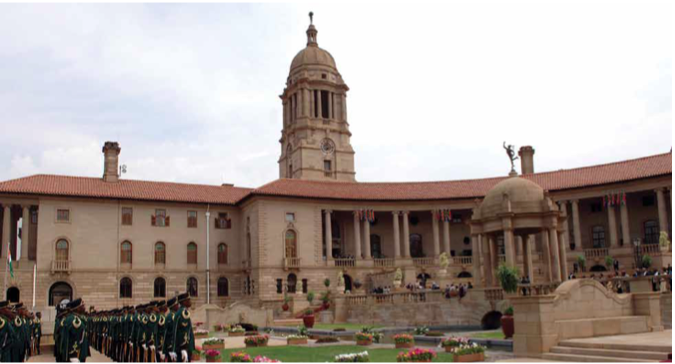
Since the 2009 elections, government has provided increasingly more people with services to improve their lives.
This is according to a study of the work done by all levels of government carried out by the Department of Performance Monitoring and Evaluation (DPME) in the Presidency.
Called the Mid-Term Review (MTR), the study looks at the work performed by various arms of government halfway through its term, which ends in 2014.
The DPME has been monitoring work done by government departments and reports quarterly to Cabinet and the President.
Minister of DPME, Collins Chabane says the review focuses on government’s progress against the delivery agreements for the 12 outcomes. “The outcomes are focused on national priorities such as education, health, crime and corruption, jobs and rural development.”
Although the MTR is a high-level document that does not comprehensively cover every single aspect of government’s work, it is fairly detailed. We highlight some of the achievements notched up since the 2009 elections.
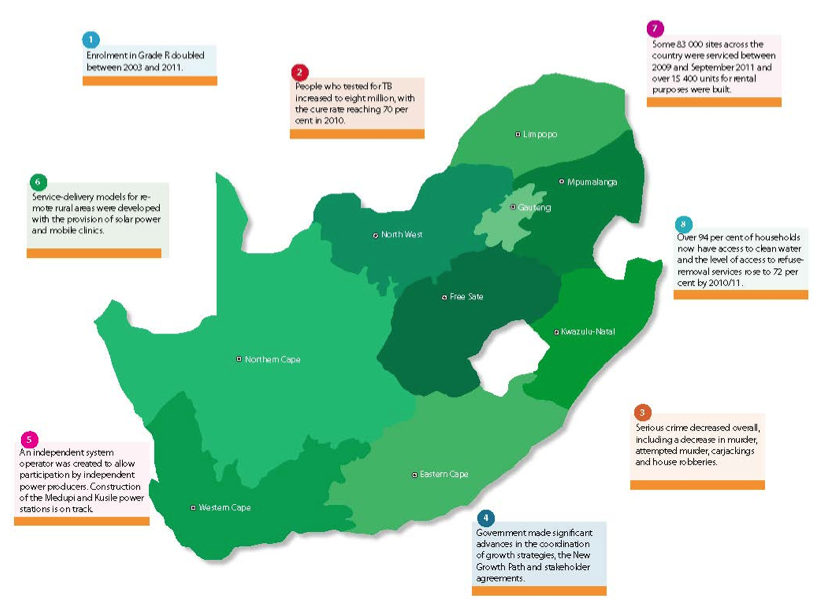
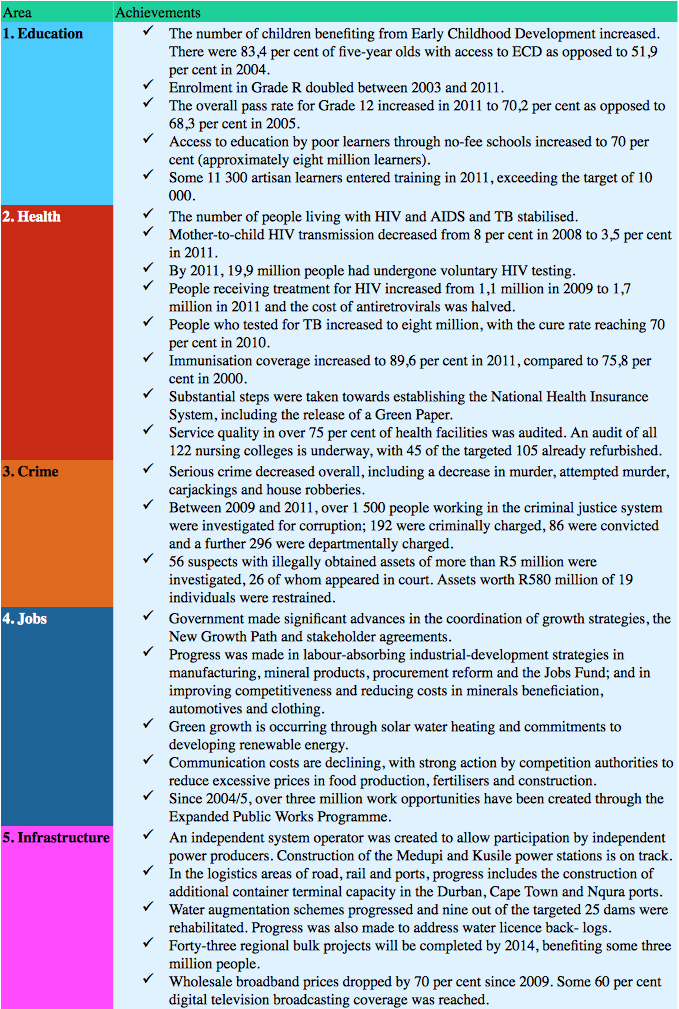
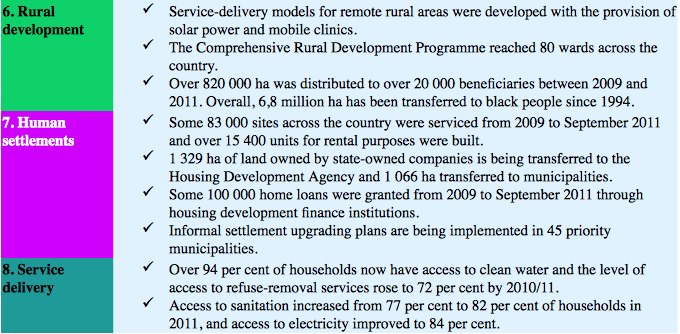
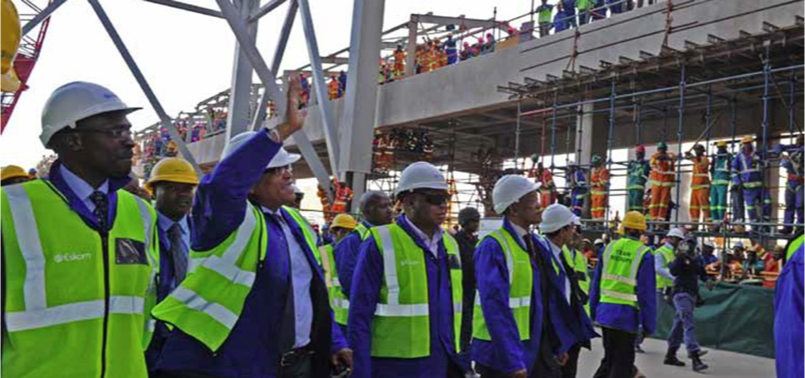
Photo caption: Public Enterprises Minister Malusi Gigaba, President Jacob Zuma, Limpopo Premier Cassel Mathale, and the then Deputy Minister of Public Enterprises Benedict Martins at Medupi Power Station in Limpopo during a hydrostatic boiler pressure test.
On the Public Service
The review noted that from 2007 to 2011, more people have been getting services from government departments a lot quicker. Some examples are:
■ identity-book applications: reduced from 127 days to 45 days
■ small business applications for funds to the South African Microfinance Apex Fund: reduced from 107 days to 70 days
■ small business applications for funds to the Industrial Development Corporation: reduced from 60 days to 51 days
■ processing new social-grant applications: reduced from 30 days to nine days
■ applications for prospecting rights: reduced from six months to three months
■ applications for mining rights: reduced from 12 months to six months
■ South African Police Service (SAPS) reaction times for reported serious crimes in progress: reduced from 50 minutes to 18 minutes
■ SAPS reaction times for serious crimes that had already occurred: reduced from 75 minutes to 24 minutes
■ processing of payments to service-providers: reduced to 30 days.
In addition, the overall compliance rate across all national and provincial departments for putting in place service delivery standards for 2009–12 is 78 per cent. The drive to get senior managers to submit signed performance agreements is currently at 83 per cent compliance but this must reach the 100 per cent mark to tighten performance management.
Also, the recent findings of the Auditor-General show that of the 40 national departments, 74 per cent received a finding of unqualified in 2010/11, an improvement from the 66 per cent in 2009/10 – but this must continue to receive attention.
Key skills shortages were also identified in the review, as was the need for stronger use of ICT and dealing with disciplinary issues. “We have made great progress in a number of areas, but much work still needs to be done,” said Minister Chabane.
“We know that it will take time and perseverance to achieve the culture change that we are looking for. It will not happen overnight. South Africa is not unique in this regard
– many countries are grappling with the same challenge of transforming their ad- ministrations so that they are both capable and developmental and we are engaging in discussions with other countries to share experiences,”
Unemployed youth take to road safety
Unemployed youth take to road safety sadminEmployment news
Unemployed youth take to road safety
Sekgabo Kedijang
A group of previously unemployed young men and women will soon be qualified to help make roads safer in North West. This follows the province’s commitment to intensify traffic law enforcement operations by increasing visibility of law enforcement officers.
About 20 young people below the age of 35 are being trained in traffic management to relieve the shortage of traffic officers in North West and to significantly reduce fatal road accidents.
They have been contracted by the North West Department of Human Settlements, Public Safety and Liaison to be part of a learnership programme on Road Traffic Law Enforcement (NQL 4).
The recruits, who are attending the Traffic Management College in Limpopo for 12 months, are receiving theoretical and practical training at different traffic management levels.
Investing in skills
MEC Nono Maloyi said the learnership programme was one of the programmes they were using to address the shortage of traffic officers. “We intend to recruit more young people as this will also reduce the high number of unemployment in the country, which is one of government’s priorities this year.”
Encouraging the recruits to take their training seriously, Maloyi said, “The province is already investing in your skills and we are expecting you to come and make the provincial roads safer for everyone.”
We’ll do our best
Speaking on behalf of the contracted learners, Lerato Jood promised that they would join forces and work as a team to put the province on the map. “We will do our best to ensure that we enforce road traffic law to reduce road carnage in the province upon our return.”
Lerato was thrilled at being chosen for the programme from about 210 applicants and to be given such an opportunity. “The learnership has proved to be exciting, it’s a great learning curve and we are also trained on how to be disciplined.”
Another trainee, Kabelo Ntwayagae, said the programme was a wonderful opportunity as it provided him with extensive theoretical and practical knowledge which he hoped to use in the near future.
For more information, contact the North West Department of Human Settlements, Public Safety and Liaison: 018 387 6061, fax: 018 384 1569, e-mail: motshabi@nwpg.gov.za